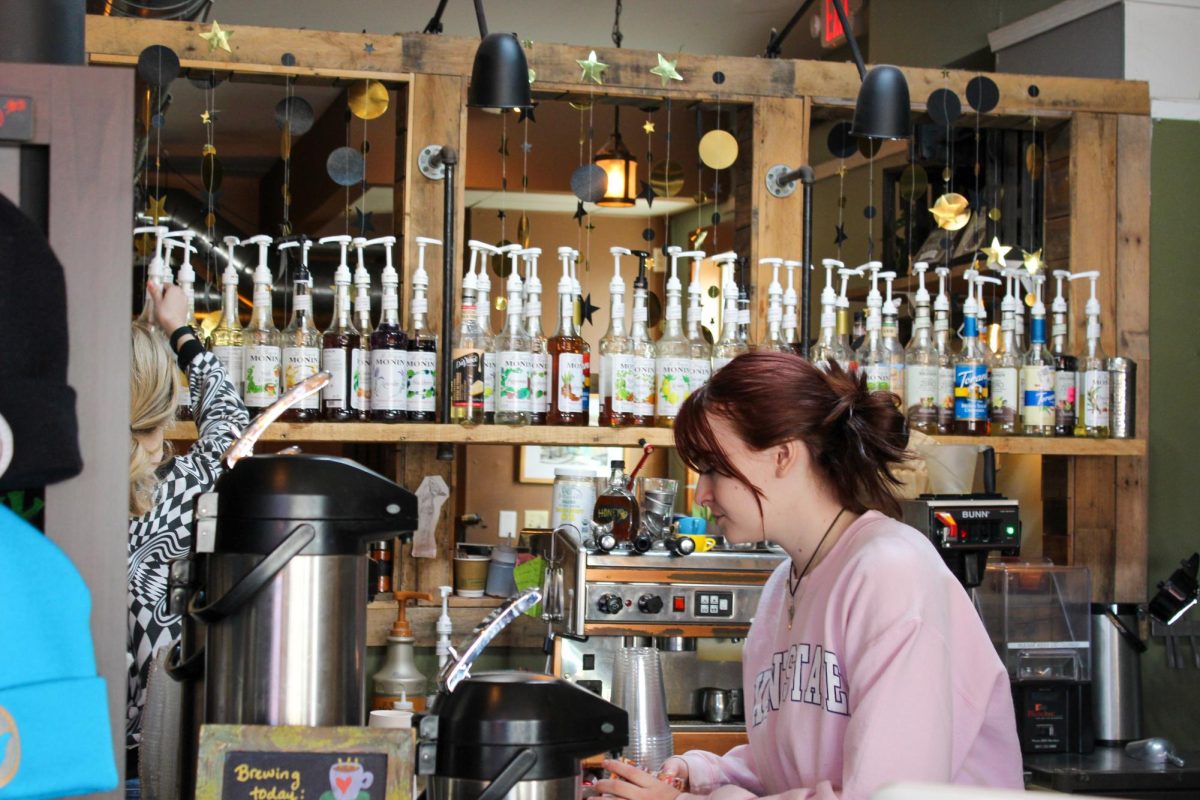‘Ragtime’ takes KSU students back in time
February 17, 2012
var so = new SWFObject(‘http://www.staterinteractive.com/player.swf’,’mpl’,’665′,’450′,’9′);
so.addParam(‘allowscriptaccess’,’always’);
so.addParam(‘allowfullscreen’,’true’);
so.addParam(‘flashvars’,’&file=RAGTIMESOT.flv&image=http://www.staterinteractive.com/photos/spring12/XXXXXXXXphotoXXXXXXXX.jpg&frontcolor=6666FF&lightcolor=EEEEEE&skin=http://www.staterinteractive.com/snel.swf&streamer=rtmp://flashmedia.kent.edu/fms-jmc/kentWired’);
so.write(‘RAGTIMESOT.flv’);
It was 1906. It was Ragtime. This weekend we go back in time with the musical “Ragtime,” produced by the School of Theatre and School of Music, and it starts tonight in E. Turner Stump Theatre.
Three drastically different groups of people illustrate their journey, struggles and triumphs at the turn of the 20th century.
“Every character wants a better life for their children, and they have hope for the future,” said Eric van Baars, director of the musical and associate professor. “It’s all about the American dream. The characters in this play overcome their prejudices. Even though the whole story is set 100 years ago, it’s really pertinent to families today.”
The story is centered on three families and how their lives intersect. There are the white aristocrats. They are trying to find their way in a changing world. There are the immigrants. They strive to obtain the American dream in a new world. There are the blacks. They struggle with love, discrimination and wish for a better world.
Here are the stories of the actors about how they learned and related to their characters in the world of Ragtime.
The Harlem group: Reaching for deeper feelings
Alexandria Echols, sophomore musical theater major who is part of the Harlem ensemble, said she had to put herself in the mindset of the time period.
“I close my eyes and think,” Echols said. “I imagine the streets, what the houses looked like, what the people looked like, then I think of the costumes and the set.”
Echols looked to relatives for an understanding of the times.
“I asked my mom some questions about my grandmother as far as the kind of things she went through,” Echols said. “My grandmother was born a little after, like 1920s, but I felt like it was still relative just to know what she had to go through to get to where she was.”
Echols said she had to imagine details.
“Everyone has put his or her own life and experiences into each character,” Echols said.
As a part of the ensemble, Echols didn’t have a specific character.
“We all gave each other names and personas,” Echols said. “It was really helpful to play a character, not just a part.”
Brittnie Price, a sophomore musical theater major, plays Sarah, the wife of lead character Coalhouse Porter. She found it easy and challenging at the same time.
“It’s simple because she is a very simple character,” Price said. “She’s just loving. But looking deeper, she buried her baby. I could never imagine doing something like that.
“I think my biggest challenge was delving into the story. Not getting caught up in the beauty of it, just understanding what each character feels so deeply. You have to feel it to portray it. You can’t tell the story without feeling the story.”
Price said the differences between wardrobes were hard to understand at times.
“I love period costumes,” Price said. “They are very flattering. It gives you a lot of insight to where everyone fits in society. My costume is very risqué for the time. Maybe part of my ankles show.” The Harlem group struggled to understand the discrimination of the time.
“I think the problem with race is not anywhere near as prominent now as it is in the show,” Price said. “It blows my mind it ever existed. So playing it out is a roller coaster; we’re all trying to figure out how it worked. I never had too much of an experience dealing with it firsthand.”
Echols said it was important to remember they were acting.
“You notice the racial tension on stage, and we’re all acting,” Echols said. “When they’re saying the words on stage that they said then, it’s kind of shocking. Sometimes its like, ‘Whoa, I can’t believe you said that,’ but then it’s like, well, that was normal then.”
The New Rochelle Group: Searching for the essence
Jace Craft-Miller, a junior musical theater major, plays the role of Younger Brother — the New Rochelle family is not given specific names, but they are referred to as Mother, Father, etc.
Craft-Miller looked into the background of his role.
“I start off researching the time,” Craft-Miller said. “What people were wearing? What people were doing? What was going on during that time? And important events. And then I research the area.”
Erin Diroll, a senior musical theater major who plays performer Evelyn Nesbit, had access to more background information because she played a character that actually existed.
“She was a vaudeville star and she posed nude for artists,” Diroll said. “That was something I would never do.”
Danielle Dorfman, a junior musical theater major, was part of the ensemble.
“I don’t have set lines,” Dorfman said. “You have to be imaginative.”
Research was helpful, but some things are left up to the actor.
“Obviously we weren’t alive then, so all we have to go off is research or books and things that people are telling us,” Dorfman said. “You can get a lot from that, but you can’t get the complete essence.”
Diroll was able to connect with her character through feelings.
“She wants love and attention,” Diroll said. “Everyone wants to be loved and cared for.”
A very different clothing style made Diroll’s role more difficult.
“I’m corseted,” Diroll said. “Nowadays it’s about being thin, but just being thin. Back then you wanted this “S” curve to your body, so you wanted a really tiny waist. Having an authentic corset really took sometime to get used to.”
Diroll said it was a gradual adaption process.
“I started off with it looser, and every rehearsal I would go a bit tighter,” Diroll said.
Dorfman said they had to learn to behave in a whole different way.
“I tell myself I need to stand up straight,” Dorfman said. “They never would have slouched or said, ‘Um’ or ‘OK.’”
Craft-Miller had to adjust his tone and speed.
“Younger Brother has a lot of long lines where he has very rich language,” Miller said. “I tend to rush through them. I try to focus on using the language, and using it in a way that it is portrayed correctly.”
Interview with Director:
Two years ago, Eric van Baars started preparation for the “grand, epic and lavish” musical “Ragtime.”
After the opening tonight, the production runs until Feb. 26.
“It’s really a beautiful story,” said van Baars, an associate professor in the School of Theatre and Dance. “The music is gorgeous. The story is personal; it’s about people triumphing over injustices and creating families and empowering women. It’s about making the best life you can for the next generation.”
Van Baars said the story is easily relatable.
“It’s all about the American dream. The characters in this play overcome their prejudices. Even though the whole story is set 100 years ago, it’s really pertinent to families today.”
“It’s a thrill ride,” van Baars. “To me it’s like going to Disney World. It starts up and doesn’t stop.”
Collaborating with the School of Music allowed Ragtime to be one of the largest university performances in 10 years.
“We haven’t done a musical of this scale since I’ve been here,” said van Baars, the director of Ragtime.
Van Baars said because Ragtime is so lavish, minor changes were made to accommodate for the resources available.
“We’re doing Ragtime version two,” Van Baars said. “It’s been mainly scaled down in the orchestra. The original has 32; ours has 24.
“It’s been a challenge,” he said. “I had to look at it from the perspective of OK, what’s the minimal amount we need to bring this story to life? You gotta do the best you can with what you got.” Van Baars said every song has an emotional connection to the story, and it’s hard not to be moved by the craftsmanship of the music.
“You will never see a show in Kent that has this much spectacle for the value of a student ticket price,” van Baars said. “It’s the perfect post-Valentine’s Day date night. There’s a lot of love.”
The Immigrant group: Relating on a basic level
For Tim Welsh, a junior musical theater major who plays the immigrant father Tateh, background research helps.
“But people can get too caught up in it and forget they’re playing a person and not a situation,” Welsh said.
“You get to know characters by what they say, and then you try and figure out why they’re saying it. If you understand why someone’s saying it you understand them.”
Welsh picked out simple characteristics and overlooked time period.
“I looked at Tateh and what I knew about Tateh at a very basic level,” Welsh said. “He’s a father, an artist, a dreamer, a hard worker. The thing that is less significant is he lives in the turn of the century. The styles and the language are secondary. It’s a much more simple connection.”
Welsh used characteristics of his own father.
“I was raised with a very strong relationship with both of my parents,” Welsh said. “There are moments when I think that most of my father comes out.”
Welsh needed to examine the accent and dialect of his character.
“There’s actually a website that has a map of the world and you click the country and it give you examples of speech. And I learned through mimicking it.”
Collin Rowe, a junior vocal performance major who plays villain Willie Conklin, had to learn how to be a different kind of person.
“I’ve never had to portray the evil antagonist character,” Rowe said. “It makes it harder because it’s not someone I want to be every day.”
“I watched a lot of older movies and tried to characterize little bits and pieces of every villain,” Rowe said.
Caitlin Rose, a junior musical theater major who plays Kathleen, related to her character at a more personal level.
“My part of Kathleen — she’s an Irish maid,” Rose said. “My grandmother was almost full-blooded Irish, and her name was Kathleen. I was actually called back for the lead female role, and I was very disappointed when I didn’t get it. But then I made this discovery. I really tried to channel my grandmother into this part.”
And like Erin Diroll, who plays Evelyn Nesbit, she had to adjust to the costumes.
“I’ve never worn that many layers on stage before,” Rose said. “And the girls requested they get their corsets ASAP, so they could start rehearsing in it. It restricts all the support for our singing.”
Rose found it ironic when she could see both time periods simultaneously.
“All the girls were in the dressing room going through a run-through for hair and makeup for the show,” Rose said. “From the neck up we were in a completely different time, and we’d be sitting there on our cellphones.”
Contact Megan Confer at [email protected].














